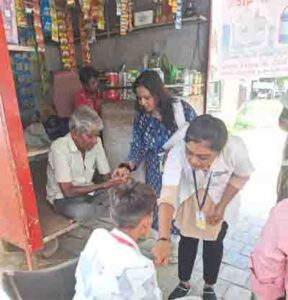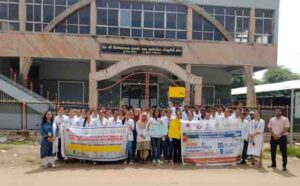- Led by Principal, Dr. Amita V Peter, the awareness rally educated some 200 students and locals about the importance of prevention, symptoms, and treatment of the Chandipura Virus
- By understanding the virus and its impact, the community can better cooperate with health authorities and follow recommended practices during an outbreak
NE HEALTH BUREAU
GANDHINAGAR, JULY 24
Swarrnim Startup & Innovation University recently organised an awareness campaign about curbing the spread and prevention of Chandipura Virus at Tintoda Village in Gandhinagar District of Gujarat. About 58 students and faculty members from Aarihant Homeopathic Medical College and Research (AHMCRI) Institute facilitated the event.

Led by Principal, Dr. Amita V Peter, the awareness rally educated some 200 students and locals about the importance of prevention, symptoms, and treatment of the Chandipura Virus.

The event was organised with a view to create awareness and educate the public about the Chandipura Virus with a special focus on its transmission, symptoms, and preventive measures. It was facilitated by faculty coordinators, Dr. Jaya Srivastava, Dr. Vishal Shukla, and Dr. Kajal Joshi.
Raising awareness about the health impacts and risk factors of Chandipura virus, and informing people about prevention methods is the first step to safeguarding the population, according to Swarrnim University experts.
Students involved the local community in establishing a support network for disease prevention. Villagers were informed in detail about the available medical treatments for the disease. They were also guided on how and where to seek help if symptoms do not subside.
Furthermore, the campaign also focussed on doing away with the stigma attached to the disease to accelerate early detection. They informed community members about the symptoms of Chandipura Virus to encourage timely medical consultation and diagnosis in a bid to reduce further health complications among community members.
By understanding the virus and its impact, the community can better cooperate with health authorities and follow recommended practices during an outbreak.












